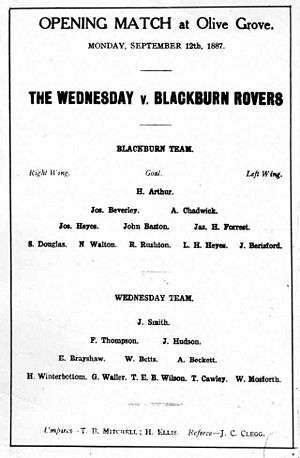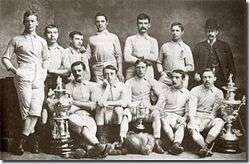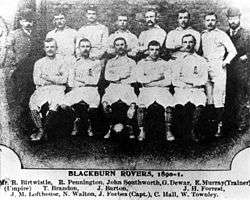History of Blackburn Rovers F.C.
| Full name | Blackburn Rovers Football Club | ||
|---|---|---|---|
| Nickname(s) | Rovers, Blue and Whites | ||
| Founded | 1875 | ||
| Ground | Ewood Park, Blackburn, Lancashire | ||
| Capacity | 31,367 | ||
| Owner | Venky's London Limited | ||
| Chairman | Vacant | ||
| Manager | Alex Iivesey | ||
| League | Football League Championship | ||
| Championship, 8th | |||
| Website | Club home page | ||
|
| |||
Blackburn Rovers are an English football club formed in 1875.
The early years

The first match played by Blackburn Rovers took place in Church, Lancashire on 11 December 1875.[1]
On 28 September 1878, Blackburn Rovers became one of 23 clubs to form the Lancashire Football Association. On 1 November 1879 the club played in the FA Cup for the first time, beating the Tyne Association Football Club 5–1. Rovers were eventually put out of the competition in the third round after suffering a heavy 6–0 defeat by Nottingham Forest.
During the 1881–82 season, the club continued to rent the facilities at Alexandra Meadows, but began to look towards a move elsewhere. As the leading club in the area, it was felt that Rovers needed its own ground. A ground was leased at Leamington Street and £500 was spent on a new grandstand capable of seating 600–700 spectators. Boards were placed around the pitch to help prevent a repeat of the crowd troubles with Darwen, and a large ornate entrance arch was erected bearing the name of the club and ground.

On 25 March 1882, the club won through to the final of the FA Cup against the Old Etonians. Blackburn Rovers was the first provincial team to reach the final, but the result was a 1–0 defeat by the Old Etonians. There was no repeat of the previous season's success during the 1882–83 season, when Rovers suffered a bitter defeat 1–0 at the hands of Darwen in the second-round. Local rivals Blackburn Olympic went on to be the first provincial team to actually win the FA Cup.
Rovers won the FA Cup in 1884 with a 2–1 victory over Queen's Park F.C.. The same teams played the FA Cup final again the next season, with Blackburn Rovers again emerging victorious, with a 2–0 win. Rovers repeated this success again the next season, winning the final against West Bromwich Albion.[2]
The Football League and Ewood Park
On 2 March 1888, William McGregor, a Birmingham shopkeeper and a committee member of Aston Villa Football Club, sent a letter to five clubs — Blackburn Rovers among them — suggesting that twelve of the leading clubs should organise a series of home and away matches between themselves. With the introduction of professional players, it seemed natural that better organisation should be brought to the complex and chaotic system of friendly and competitive matches prevalent at the time. On 22 March 1888 John Birtwistle represented Blackburn Rovers at a meeting of a number of clubs at the Anderton Hotel in London. This meeting, and subsequent ones, led to the creation of the Football League, with Blackburn Rovers as part of it. Rovers finished the inaugural season of the league in fourth place, and unbeaten at home.
Blackburn Rovers again reached the FA Cup final on 29 March 1890 at the Kennington Oval. The club claimed the trophy, for the fourth time, by beating Sheffield Wednesday a hefty 6–1 — with left forward William Townley scoring three goals and becoming the first player to achieve a hat-trick in the FA Cup final. The summer of 1890 brought yet another significant event in the history of Blackburn Rovers with the decision to move again. The choice of new home was Ewood Park, and it remained the club's home for the next century or more.

The 1890–1891 season saw Blackburn Rovers win the FA Cup for fifth time against Notts County F.C. with a 3–1 victory.
Early 20th century
They were league champions in 1912 and 1914, and FA Cup winners in 1928.
Mid 20th century
Blackburn Rovers maintained a respectable mid-table position in the First Division until they were finally relegated (along with Aston Villa) from the top flight (for the first time since the foundation of the league) in the 1935–36 season. Their final match prior to relegation was a triumph. By the last game of the season, they were already certain to be relegated, but at Villa Park, they beat the home side, thus dragging the only other team of the original Football League who had never been relegated, Aston Villa, with them. They struggled in the second division for the next two seasons, until winning the Second Division title in the final season before the war.
When the league resumed after the war, Blackburn Rovers were relegated in their second season (1947–48) and remained in the second division for the following ten years. After promotion in 1958, they again returned to the mid-table position they had occupied in the earlier part of the century. During this time, they seldom made a serious challenge for a major trophy — although they did reach the 1960 FA Cup final when managed by Scot Dally Duncan. Rovers lost this game 3–0 to Wolverhampton Wanderers after playing most of the game with only 10 men on the field. Full back Dave Whelan was lost during the game to a broken leg, the game being played in the days before substitutes were allowed. Despite losing, cup final man of the match was future Scotland manager Ally MacLeod (left winger MacLeod scored 47 goals in 193 appearances for Rovers). During the 1960s Blackburn Rovers had several players who made it into national teams. They were again relegated from the First Division in 1966 and began a 26-year exile from the top division.
1970s and 1980s
They won the Third Division title in 1975.
They were promoted as runners up in the Third Division in 1980. In 1988–89 they reached the Second Division playoff final in its last-ever season of the home-away two-legged format — but lost to Crystal Palace. In 1989–90 they lost in the Second Division play-off semi-finals, but the following season saw the club taken over by local steelworks owner and lifelong supporter Jack Walker.
The 1990s: The Jack Walker Revolution
Local steel baron Jack Walker, a lifelong Blackburn Rovers fan, had started funding the club during the 1980s and provided money to pay for the new Walktersteel Stand, which replaced the Riverside Stand in 1988. He also funded the short-term acquisition of Ossie Ardiles and Steve Archibald around the same time, and by the end of the 1990-91 season had gained full ownership of the club. Blackburn had started the 1990s promisingly, qualifying for the Second Division playoffs in 1990, only to finish 19th a year later, but Walker's funds meant that Blackburn found themselves being able to attract players for fees and wages which had previously only been afforded by First Division clubs.
Although an attempt to sign the England striker Gary Lineker from Tottenham Hotspur in the summer of 1991 failed, the appointment of Kenny Dalglish as manager on 12 October 1991 helped boost the club's profile and make the rest of the footballing world aware of Walker's ambition, and over the course of the 1991-92 season Blackburn spent millions of pounds on building a promotion-winning team, with Roy Wegerle, Mike Newell, Duncan Shearer and Tim Sherwood being signed. The club's top scorer, David Speedie, had signed from Liverpool during the 1991 close season. Blackburn had constantly led the Second Division table throughout the 1991-92 season, but a run of bad results late in the season meant that they had to win their final game of the season just to qualify for the playoffs and keep their dreams of a place in the new FA Premier League alive.
After beating the Second Divisions other big-spending club, Derby County, in the semi-finals, Blackburn reached the play-off final at Wembley where they beat Leicester City 1–0 thanks to a Mike Newell penalty.
Rovers made headlines in the summer of 1992 by paying an English record fee of £3.5million for the 22-year-old Southampton and England centre forward Alan Shearer. They remained in the title challenge for most of the season before finishing fourth in the final table. Shearer had found the net 16 times in his first 21 league games for Blackburn before suffering a knee injury which ruled him out for the second half of the season.
In 1993–94, they were Premiership runners-up to Manchester United, finishing seven points behind the champions, who had enjoyed a double-digit lead for much of the season before a slump during its final quarter had seen Blackburn level on points with them on 2 April 1994. However, Blackburn then began to drop points while United recaptured their form, with the title finally slipping out of Blackburn's grasp on 1 May 1994.
Rovers broke the English transfer fee record again a few weeks later when paying Norwich City £5million for 21-year-old striker Chris Sutton.
Blackburn finally won the Premier League title at the third attempt in 1995 - their first top division title for 81 years. They finished one point ahead of Manchester United, having led the table for most of the season and had an eight-point lead with barely a month of the season remaining, but started to drop points as Alex Ferguson's team enjoyed a three-match winning run and Blackburn began to drop points. Blackburn lost their final game 2-1 at Liverpool, but Ferguson's men were held to a 1-1 draw at West Ham, and their failure to beat the East Londoners gave Blackburn the title.
Kenny Dalglish moved upstairs to the position of Director of Football at the end of the championship season, and handed over the reins to his assistant Ray Harford. It was at this stage that Blackburn's spending spree came to an end.
Blackburn Rovers made a poor start to the 1995–96 season, and found themselves in the bottom half for most of the first half of the season. Rovers also struggled in the Champions League and finished bottom of their group with just four points. A 7–0 victory over Nottingham Forest on the day of the official opening of the redeveloped all-seater Ewood Park and a 4–1 win over Rosenborg were two highlights of an otherwise disappointing season. Alan Shearer became the first striker to score more than 30 Premiership goals in three successive seasons. Blackburn Rovers improved as the season went on, finishing seventh in the Premiership, just missing out on a place in the UEFA Cup.
Alan Shearer was sold to hometown club Newcastle United for a then world record fee of £15million in the summer of 1996.
Rovers failed to win in their opening 10 games of the 1996–97 Premiership and Harford resigned. Caretaker manager Tony Parkes kept Blackburn up as their form improved and they finished 13th. Roy Hodgson took over that summer and Blackburn emerged as title contenders in 1997-98 before finishing sixth, although they did qualify for the UEFA Cup.[3]
However, Hodgson was sacked in November 1998 after a terrible start to the season left them in the relegation zone. Manchester United assistant Brian Kidd took over at Ewood Park, but was unable to prevent relegation - their doom was confirmed in the penultimate game when they drew 0-0 at home with Kidd's former club. Kidd himself was sacked the following November, leaving Tony Parkes to take temporary charge again.
The new millennium
They were promoted back to the Premier League in 2000–01.
In 2001–02 they won their first-ever League Cup by beating Tottenham Hotspur 2–1 at the Millennium Stadium in Cardiff.
In 2004–05 they reached the FA Cup semi-final against Arsenal.
After qualifying for Europe, Rovers signed South African striker Benni McCarthy from Porto as a replacement for the departed Craig Bellamy. Rovers finished top of their European group and were drawn against Bayer Leverkusen, losing 3–2 on aggregate. The club was busy during the January transfer window, signing David Dunn, Stephen Warnock, Christopher Samba and Bruno Berner. Leaving the squad were Dominic Matteo, Andy Taylor (loan), Joe Garner (loan), Lucas Neill and Jay McEveley. In cup competitions, Rovers were knocked out of the Carling Cup in the Third Round. They defeated Everton, Luton, Arsenal (after replay) and Manchester City in the FA Cup. Thereafter, they faced Chelsea for a place in the final, losing 2–1 when Michael Ballack scored Chelsea's winner in extra time. Rovers finished the season 10th in the league, with McCarthy netting 18 league goals. The club also qualified for the Intertoto Cup and drew Lithuanian side FK Vetra[4] of Vilnius.
To prepare for the 2007–08 season Rovers bought Roque Santa Cruz, Maceo Rigters and Gunnar Nielsen. In the January 2008 transfer window, Robbie Savage left for Derby in a £1.5m (rising to £2m) transfer to seek first team football. Rovers were never at any stage during the season outside the top ten and made their best start to a campaign for 10 years and Santa Cruz brilliantly shone scoring 23 goals in all competitions.[5]
On 22 June 2008, it was announced by the club that Paul Ince had been brought in to manage Rovers after MArk Hughes left, signing a three-year deal.[6] Ince was presented to the media on Tuesday 24 June. Ince's first job though as the Blackburn Manager is to persuade some of the players who wanted to follow Hughes or pursue other teams, to stay .[7]
Ince's reign as Blackburn Rovers manager got off to the perfect start, with a 3–2 away win against Everton FC in the first game to the 2008–09 season. Blackburn drew 1–1 at home to Hull City before two heavy defeats to West Ham and Arsenal. They bounced back well and recorded back-to-back wins against Fulham and Newcastle United, but faded drastically: three draws and seven defeats, including five defeats in a row to saw Blackburn slip to 19th in the table after 16 games. This led to Ince coming under increasing pressure: he enjoyed some success in the Carling Cup, with wins over Everton and Sunderland. Eventually Ince paid the price for poor results, and a 3–0 defeat away to Wigan saw him sacked a few days later. He was replaced by the former Bolton manager Sam Allardyce. Allardyce secured Premier League survival, and despite a difficult start to the 2009–10 season Rovers recovered well in the second half of the campaign to secure a comfortable 10th-place finish with 50 points — placing them 20 points clear of the relegation zone.[8]
2010 onwards
In November 2010, the Indian company V H Group bought Blackburn Rovers under the name of Venky's London Limited for £23 million.[9] The new owners immediately sacked manager Sam Allardyce and replaced him with first-team coach Steve Kean, initially on a temporary basis, but by January 2011 he had been awarded a full-time contract until June 2013.[10][11] Kean's appointment was shrouded in a great deal of controversy since his agent Jerome Anderson had earlier played a major role in advising Venky's during the takeover of the club in the preceding months.[12][13][14]
In December 2011, Blackburn Rovers posted an annual pre-tax loss of £18.6m for the year ending 30 June 2011. Despite this, the owners of Blackburn Rovers provided assurances over the continued funding of the club, even if they were relegated.[15]
On 7 May 2012, the club was relegated to the Championship after being defeated at home by Wigan Athletic at home in the penultimate game of the season, ending eleven years in the Premier League.[16]
At the start of the 2012-2013 season, Steve Kean, the manager in charge for the previous relegation season, was given a chance by owners to win promotion and kept his job as the manager. Ultimately though, pressure from the supporters who had been calling for the managers removal for months resulted in his resignation as manager on 29 September 2012.[17]
References
- ↑ "1875 - 1884: The early years". History. Blackburn Rovers FC. 2 July 2007. Archived from the original on 4 June 2012. Retrieved 6 June 2012.
- ↑ James M. Ross (5 February 2015). "England FA Challenge Cup Finals". RSSSF. Retrieved 26 March 2015.
- ↑ "Ray Harford". The Telegraph. 11 August 2003. Retrieved 16 November 2014.
- ↑ Blackburn Rovers - Vetra: 4 - 0 Match report from ScoresPro.com
- ↑ http://www.premierleague.com/page/blackburn-rovers Archived 11 May 2008 at the Wayback Machine.
- ↑ "Paul Ince Rovers New Manager". Rovers official website. 22 June 2008.
- ↑ "Warnock - Exciting times lay ahead!". BBC Sport. 23 June 2008.
- ↑ "Aston Villa 0-1 Blackburn". BBC News. 9 May 2010.
- ↑ "Rao family buy Blackburn Rovers from Jack Walker Trust". bbc.co.uk. BBC. 19 November 2010. Retrieved 19 August 2016.
- ↑ "Blackburn Rovers sack manager Sam Allardyce". BBC Sport. 13 December 2010. Retrieved 2010-12-18.
- ↑ "Steve Kean signs new Blackburn Rovers contract". BBC. 20 January 2011. Retrieved 19 August 2016.
- ↑ Conn, David. "How an agent came to hold so much power at Blackburn Rovers", The Guardian, 21 December 2010. Retrieved 19 August 2016.
- ↑ Hytner, David. "Steve Kean finds value of friends in high places at Blackburn Rovers", The Guardian, 16 December 2010. Retrieved 19 August 2016.
- ↑ "Blackburn Rovers board's dismay at Venky's conduct revealed in letter". The Guardian. 15 January 2012.
- ↑ "Venky's stress commitment to Blackburn despite £18.6m pre-tax loss". The Guardian (UK). 28 December 2011. Retrieved 5 January 2012.
- ↑ "Blackburn Rovers relegated after defeat to Wigan - CBBC Newsround".
- ↑ "Steve Kean 'forced to resign' as Blackburn Rovers manager".